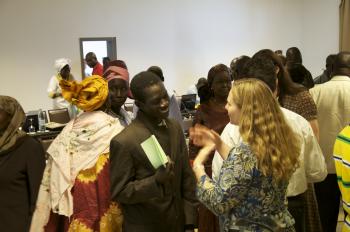In an increasingly uncertain climate, farmers’ traditional knowledge of when to sow and harvest, and when to expect rains, may no longer be enough. Supporting farmers with weather and climate information services for agricultural decision-making is a key strategy for enhancing food security in already vulnerable areas. Existing initiatives have shown that they can in fact reach farmers and provide a valuable service, but the challenge of broadening the impact of climate services in vulnerable communities remains.
In the light of this, the CGIAR Research Program on Climate Change, Agriculture and Food Security (CCAFS) Theme 2, “Adapting through managing climate risk,” hosted a workshop on “Scaling Up Climate Services for Farmers in Africa and South Asia” in mid-December in Senegal, to create ways forward for broadening the impact of climate services and making them work for smallholder farmers.
This was done in a collaborative effort partnering up with United States Agency for International Development (USAID), the Climate Services Partnership (CSP), and the World Meteorological Organization (WMO).
What is happening in the field?
By sharing good practices and constraints to delivering climate services in sub-Saharan Africa and South Asia, the workshop sought to identify a set of opportunities to address gaps by mobilizing partnerships and learning both within and across regions.
At the moment, CCAFS is supporting evaluations of national agrometerological advisory services in Mali and India. The Mali experience has shown success in reaching farmers with agro-climate advisories, and now CCAFS is investigating if this project can be scaled up in other West African countries. During the workshop, participants heard about the findings from an evaluation report done in India, where qualitative findings showed what is working and what isn’t with India agromet. The evaluations are being used to identify gaps and opportunities for moving forward.
Participants in the workshop in addition got to listen to agrometeorological and extension officers, research scientists leading the evaluations, and farmers that have benefited from the climate services.
Empowerment and equity – two key components when it comes to successful climate services
Both evaluations highlighted the importance of building capacity at all levels to fully engage and empower farmers in the process of climate services production and delivery, with a particular concern for equity. In an example from India, researcher Kalpana Venkatasubramanian noted that the use of agrometeorological information was higher in villages where women are fully involved as key partners in its production and delivery. In the photo: workshop participants discuss prerequisites and needed support for scaling up climate services in Sub-Saharan Africa and South Asia.
In the photo: workshop participants discuss prerequisites and needed support for scaling up climate services in Sub-Saharan Africa and South Asia.
Climate information for whom?
The “packaging” of climate services with inputs and interventions needed for farmers to fully put them to use is crucial, but will be different in each location. Across the case studies, the importance of local context repeatedly rose to the surface, extending far beyond the downscaling of climate information to appropriate spatial scales. How can we fully take farmers’ needs into account in the development and provision of climate services? Engaging farmers in participatory platforms of climate services projects is key in making sure information packages are appropriate. And will be used as intended.
Bundling climate services with the inputs and interventions farmers need to fully put them to use will require coordination among funding agencies in developing interventions that can address all needs, and higher level enabling policies. But at the same time, we need innovative solutions that ensure that farmers’ voices are not lost at the level of policy making.
Drawing upon discussions and the case studies presented, workshop participants converged upon a set of ideas for addressing these issues and other major climate services gaps in sub-Saharan Africa and South Asia, and convened communities of practice to set them in motion. Reports and stories from the conference will flesh out these actionable ideas and the next steps for carrying them forward. Stay tuned on our blog for more information!
Original Article Here







